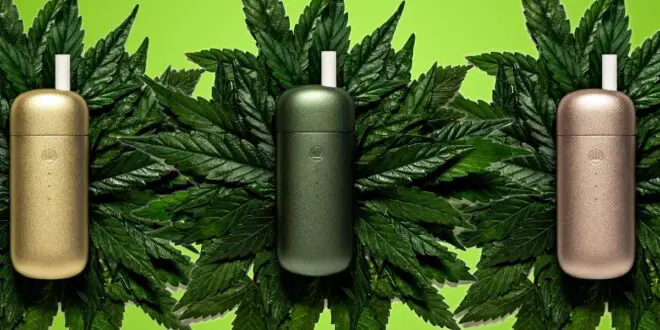The weed vape boom at the beginning of the 21st century was met with exactly the opposite reactions by marijuana fans and environmental activists:
- Cannabis enthusiasts have seen it as a comfortable and socially acceptable way to enjoy marijuana’s unparalleled effects or take cannabinoids as a remedy.
- Environmentalists raised the alarm regarding disposable vapes: the great popularity of this method of taking marijuana could lead to mountains of garbage.
This opposition has had a positive effect, and manufacturers were forced to introduce eco-friendly practices to avoid criticism and promote the responsible use of one of the most useful herbs. Thanks to the measures taken by them, a THC vape pen for sale (hub420.shop) is associated with respect for nature and people, and vapers learn the practices of sustainable cannabis use promoted by manufacturing companies.
What Was the Problem with Recycling Vape Pens
One of the main challenges manufacturers faced when introducing weed vape pens to the market was the legal ambivalence regarding marijuana. While the movement to legalize cannabis has been gaining momentum around the world, countries have been very slow to give up their prohibitive positions on the issue. At first, they preferred to take half measures and allow the medical use of cannabis. Then, having seen the public reaction and the consequences of partial legalization, they have already moved on to full legalization. Because of this, a dual situation has developed with respect to vape pens:
- Manufacturers made them from materials that were easily recycled. Depending on budget and preference, buyers could choose a vape pen made from eco-friendly ceramics, glass, or synthetic materials such as recycled plastic.
- However, by law, facilities that recycled other products from similar materials could not accept and process weed vapes. The main reason is residual cannabis, which partially remained on the case and in the cartridge.
Original Solution from Manufacturers
To find a way out of this situation, leading weed vape companies such as Dosist, Bloom, and others initiated a collection program. At the places of sale of vape pens, they installed special containers where consumers could put their used vapes and cartridges. Subsequently, their main task was to clear them of marijuana residues to hand them over to recycling plants in this form. For example, Bloom used ethanol wash to clean the cartridges.
Stimulating Eco-Friendly Practices Among Consumers
With the help of this measure, the disputable issue with the law and the authorities was resolved. However, there was still one more challenge: how to stimulate consumers, because it is much easier to throw a used vape pen or cartridge in the trash than to take it back to the store. After seeing the low return rate of used vapes, manufacturers and retailers have taken another important step to implement the sustainability policy and implement eco-friendly practices among vapers. They started giving a discount on the purchase of new vape pens in exchange for the return of used ones. This decision had the desired effect, and boxes for used weed vape pens began to fill up at a much faster rate.
Alternative Solution: Development of Ancillary Cannabis Businesses
When experts say that the full legalization of cannabis has a positive effect on the economy through the creation of additional jobs, they mean not only the cultivation of marijuana. The cannabis industry involves many ancillary businesses that contribute to a faster normalization of all issues related to the production, distribution, and use of cannabis. Neutralizing the negative impact on the environment is one of the primary tasks since vaping is positioned as a safer way to consume cannabis for the environment and people than smoking joints.
Therefore, some companies have decided to create circular markets and special ancillary facilities that would separate the reusable components of the vape, which can later be reused after processing or purification. Such tasks require additional employees. This means that by solving environmental challenges, the cannabis industry simultaneously helps to loosen the grip of social ones by employing a large number of specialists in various professions.
What Cannabis Consumers and Sellers Can do to Protect the Environment
The challenge of adhering to eco-friendly practices should extend not only to vaping companies but also to distributors and consumers:
- Online and offline stores can participate in used vape collection programs. They should give preferences to those manufacturers who care about the recycling of used products and offer other measures aimed at protecting the environment.
- Consumers should be aware of the environmental hazards of lithium batteries, plastics, and other durable materials used in the manufacture of vape pens. They must adopt responsible vaping practices and, at a minimum, participate in used vape collection programs.
- They can also opt for a reusable vape pen. Of course, they are more expensive than disposable ones, but in the end, they become more cost-effective not only for the environment but also for consumers. This is especially true for those who use cannabis quite regularly, which means they buy disposable vape pens and then throw them away quite often.
- Sustaining the environment does not only mean taking care of the land, which has to recycle all the garbage for centuries, or water, which can end up with plastic. It is also essential to remember about animals. Since the cannabis oil concentrates used in weed vape pens may attract some animals, make sure that the liquid cannot be accessed by them. Ingestion of this concentrate by wild or domestic animals leads to severe cases of poisoning. Therefore, if you do not recycle your vape pen, before throwing away the used cartridge, make sure that there is no liquid left in it.
The Role of the State in Supporting Environmentally Sustainable Practices
The cannabis industry would greatly benefit in terms of environmental protection if governments also took some measures:
- Adapt legislation so as not to interfere with the standard procedure for recycling materials.
- Relax the requirement regarding child-resistant packaging, due to which a huge amount of plastic is spent only on the packaging of vape pens.
- Provide certain tax incentives for manufacturers that are engaged in high-quality recycling of used products.
With such strong support, all programs initiated by vape companies would receive a powerful incentive for development and further research to find optimal solutions for the recycling of used cannabis delivery devices.
If all participants in the cannabis industry, from producers to consumers, act in concert and receive government support, the responsible and eco-friendly practices of using marijuana with vape pens will become a benchmark for other industries. This will not only help save the environment but also strengthen the community of cannabis enthusiasts who will tackle even the most difficult tasks responsibly and resourcefully.
 khamush.com Lifestyle | Motivation | Poems
khamush.com Lifestyle | Motivation | Poems



